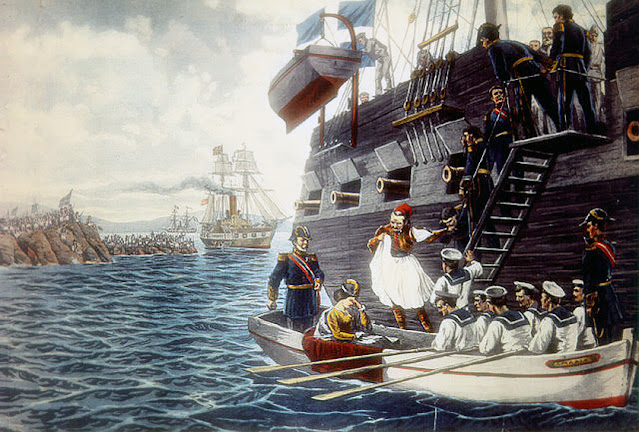 |
| A portrait of Otto as Prince of Bavaria, by Joseph Stieler. Accessed from Wikimedia Commons |
The thought of having their own sovereign, albeit he was one
who did not speak Greek at first, caused excitement among the Greeks. Otto was
given an enthusiastic welcome and thousands of Hellenes lined the
docks of Nafplio so they could personally catch a glimpse of their young king. Revolutionary heroes, like Theodoros
Kolokotronis and Alexandros Mavrokordatos, were there to greet him. The hopeful Greeks were enthusiastic that a bright future would dawn on their infant sovereign
state.
 |
| A portrait of Duchess Amelie of Oldenburg by Joseph Karl Stieler |
The early years of his reign was placed under the regency of Count Armansperg. “I entrust my son’s well-being to you,” King Ludwig told the regent. “What I place in your hands is not only something personal but it is an interest of the Bavarian people and is of historical significance to the world.”
However, “Otto lacked strength and energy, diligence and consistency,”
Luigi, Count Corti, remarked. “Although he had become a King, he retained
a childlike submission to his father, whom he regarded as his best friend.”
Otto’s reign was an ineffective one, as the king veered
more on pleasing the Great Powers, as such the country’s politics and economy
were frequently meddled by outside influences. Sir John Arthur Ransome
Marriott, a British educationist and Member of Parliament later wrote: "Otto was not a happy choice ; he neglected the national feelings, and chafed
under the limitations imposed on him by the Constitution."
 |
| King Otto and Queen Amalia embarking on HMS Scylla. Accessed from Wikimedia Commons |
Otto’s autocratic tendencies proved unpopular and several foiled attempts to expand Greek territories, including the annexation of Crete in 1841, only alienated Great Britain. Not to be daunted, he harboured the desire of a new Byzantine Empire headquartered in Constantinople. However, his “Great Idea” came to nothing as Greek intervention against Turkey during the Crimean War (1853–56) triggered the British and French forces to occupy Piraeus. His support to Austria during the Italian War of Independence (1859) further damaged his reputation. The attempt to murder his wife, Queen Amalia (whom he married in 1836) did not elicit any sympathy for the monarchy. The murderer, in fact, was hailed as a hero. While visiting Pelloponese on October 16, 1862, an uprising erupted in Vonitsa, which spread like wildfire and reached Athens on October 22. A provisional government was established which overthrew the king on October 23.
Otto and the queen left Greece but he never abdicated. In 1863, the Greek assembly elected Prince William of Denmark as the new king of Greece. Otto seemed to have never accepted his fate of losing his crown. In fact, even in exile, he continued to wear the Greek traditional uniform. When he died in the palace of the former bishops of Bamberg in Germany, on July 26, 1867, it is believe that he muttered these last words: "Greece, my Greece, my beloved Greece." It is ironic that a revolution enthroned Otto and it was also a revolution that dethroned him.

.png)





1 Comments
I started on COPD Herbal treatment from Ultimate Life Clinic, the treatment worked incredibly for my lungs condition. I used the herbal treatment for almost 4 months, it reversed my COPD. My severe shortness of breath, dry cough, chest tightness gradually disappeared. Reach Ultimate Life Clinic via their website www.ultimatelifeclinic.com . I can breath much better and It feels comfortable!
ReplyDelete